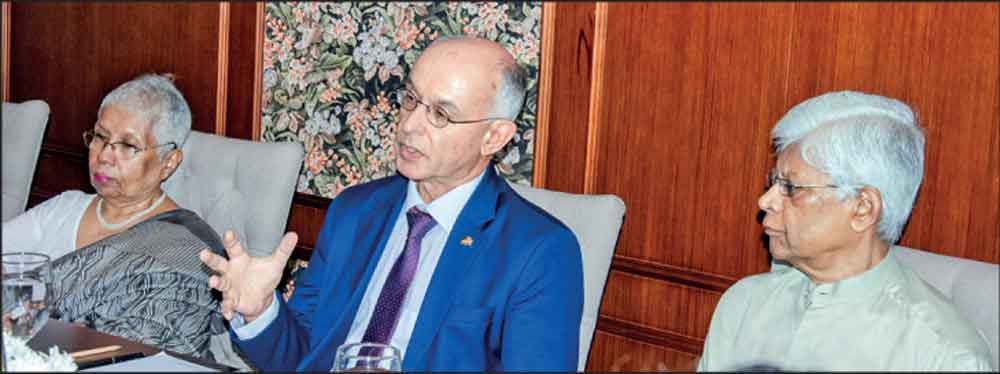Friday Feb 20, 2026
Friday Feb 20, 2026
Saturday, 1 November 2025 00:00 - - {{hitsCtrl.values.hits}}

Federal Republic of Germany Ambassador Dr. Felix Neumann (centre) gestures during the discussion
Addressing the Pathfinder Foundation’s ‘Ambassador’s Roundtable,’ the Ambassador of Federal Republic of Germany to Sri Lanka, Dr. Felix Neumann, praised Sri Lanka’s neutral foreign policy as “wise and aligned with the international principle of freedom of navigation.” He reaffirmed that Germany values Sri Lanka’s role in maintaining open and peaceful sea lanes in the Indian Ocean while supporting greater alignment with global principles in multilateral forums.
On bilateral trade and investment, Ambassador Neumann noted that around 300 German companies currently operate in Sri Lanka. He underscored the need for a more efficient bureaucracy and stronger investment protection to attract further German capital, while commending Sri Lanka’s ongoing efforts to enhance transparency and good governance.
As a Sri Lankan think tank, Pathfinder Foundation, prominent and committed to fostering dialogue on foreign policy, economic development, and strategic issues, conducts initiatives such as the Ambassador’s Roundtable, which convenes diplomats, academics, business leaders, and media representatives for high-level discussions.
At the Pathfinder Foundation’s Ambassador’s Roundtable, held Colombo Club, Taj Samudra, Colombo Dr. Felix Neumann, presented three strategic pillars of Germany’s new foreign policy following the recent change of government in Berlin. The Ambassador explained that the new Government has adopted three strategic pillars to define Germany’s foreign policy.
The Ambassador highlighted, Security—Defending Stability and Global Order—as the primary pillar, emphasising Germany’s commitment to safeguarding peace in Europe and beyond. He reaffirmed Germany’s continued support for Ukraine’s sovereignty and territorial integrity in the face of external aggression, describing the conflict as a threat to European security. He also mentioned instability in the Middle East, Sudan, and other parts of Africa as ongoing humanitarian and geopolitical challenges, adding that Germany aims to promote peace and stability through partnership and diplomacy. Emphasising the importance of the Indian Ocean to global trade, the ambassador pointed out Sri Lanka’s strategic location, stressing that democratic stability in the country contributes to peace and stability in the Indian Ocean region. He also observed that modern security extends beyond defence, encompassing energy, food, and climate security.
The second pillar, Freedom: Upholding the rule of Law and Human Rights, was described as the foundation for lasting stability. The ambassador emphasised that societies governed by the rule of law are inherently more stable and just than those led by power or force. Germany, he said, stands with those who rely on the rule of law. He highlighted that human rights, democracy, and justice form the core of Germany’s foreign policy and international engagement.
The third pillar, Wealth—Promoting Prosperity Through Partnership—the Ambassador stated that prosperity is created by citizens and entrepreneurs operating in a transparent and reliable economic environment. He welcomed Sri Lanka’s “Clean Sri Lanka” initiative launched by President Anura Kumara Dissanayake, describing it as a welcome and necessary step towards transparency and economic stability. He noted that German companies have maintained their presence in Sri Lanka for decades, even during challenging times, reflecting Germany’s long-term approach to partnership and investment. The ambassador observed that Sri Lanka currently enjoys a trade surplus with Germany, and encouraged Sri Lankan exporters to make greater use of EU trade preferences under the GSP+ scheme, which provides preferential access to the European single market. Concluding his address, the ambassador reaffirmed Germany’s commitment to a rules-based international order and a deepening of bilateral ties with Sri Lanka.
Following the presentation, the session continued with an engaging Q&A session that addressed global trade, climate policy, regional security, and Sri Lanka’s domestic and foreign policy positions.
Responding to questions on the European Union’s carbon border adjustment mechanism, the Ambassador emphasised that carbon pricing is not a protectionist tool but a necessary measure to protect the global climate. He acknowledged the challenges posed by such measures for developing economies like Sri Lanka, emphasising that Germany recognises its historical responsibility and remains a major contributor to international climate funds that support the Global South in the shift to renewable energy.
Responding to questions on Germany’s stance on Gaza, the Ambassador emphasised that Germany’s foreign policy is informed by its historical experience and a commitment to human rights and international law. Germany recognises both Israel’s and Palestine’s right to exist. The question is how best to achieve that goal, he noted, supporting a negotiated settlement to ensure lasting peace.